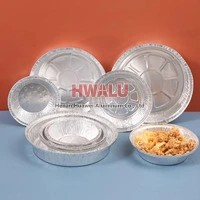aluminium foil specification Aluminum foil for coated foil Coated Products gauges/thicknesses 0.00035” - .010” Coating thicknesses .002″ Width .250” - 54.50” Length customize aluminum foil for coated foil We offer a variety of Coated Products Carbon coated aluminum foil Heat Seals Corrosion Resistant Epoxies Slip Lubes Print Primers Release Coatings, ...
Alloy parameters of aluminum foil for labels Alloy type: 1xxx, 3xxx, 8xxx Thickness: 0.01mm-0.2mm Width: 100mm-800mm Hardness: To ensure the stability and processability of the label. Surface treatment: Coating or painting treatment to improve the corrosion resistance and aesthetics of the label. Alloy type of aluminum foil for labels 1050, 1060, 1100 With high purity ...
What is aluminum foil for wine Aluminum foil for wine has excellent properties such as moisture-proof, anti-oxidation, heat insulation, and odor insulation, which can protect the quality and taste of wine products. In wine packaging, common aluminum foil materials include aluminized polyester film, aluminized polyamide film, etc. Aluminum foil for wine usually has a certain thickness and strength, which ca ...
What is aluminum foil for sealing Aluminum foil for sealing is a kind of aluminum foil used for sealing packaging. It is usually composed of aluminum foil and plastic film and other materials, and has good sealing performance and fresh-keeping performance. Aluminum foil for sealing is widely used in the packaging of food, medicine, cosmetics, medical equipment and other industries. Aluminum foil for sealing i ...
Introduction of 8079 alloy aluminum foil What is aluminum foil grade 8079? 8079 alloy aluminum foil usually used to produce kinds of aluminum alloy foil, which offers the best properties for many applications with H14, H18 and other tempers and thicknesses between 10 and 200 microns. The tensile strength and elongation of alloy 8079 are higher than other alloys, so it is not flexible and moisture resistant. ...
Aluminum foil has the following advantages in food packaging: Barrier property. Aluminum foil has excellent resistance to water, air (oxygen), light, and microorganisms, which are important factors in food spoilage. Therefore, aluminum foil has a good protective effect on food. Easy processing. Aluminum has a low melting point, good heat sealing, and easy molding. Can be processed into any shape according to ...
Aluminum foil is a versatile material with a wide range of uses across various industries and households. Here are some common uses of aluminum foil: Packaging: Aluminum foil is widely used in packaging applications. It is used to wrap food items, such as sandwiches, snacks, and leftovers, to keep them fresh and protect them from moisture, light, and odors. It is also used for packaging pharmaceutical products ...
1. Insulation and fragrance preservation Aluminum foil lunch boxes are usually used as paper-wrapped beverage packaging. The thickness of the aluminum foil in the packaging bag is only 6.5 microns. This thin aluminum layer can be waterproof, preserve umami, anti-bacterial and anti-fouling. The characteristics of preservation of fragrance and freshness make the aluminum foil lunch box possess the properties of fo ...
Lunch boxes are essential packaging boxes in the food packaging industry. Common lunch box packaging materials on the market include plastic lunch boxes, aluminum foil lunch boxes, etc. Among them, aluminum foil lunch boxes are more commonly used. For lunch box packaging, aluminum foil is widely used due to its excellent barrier properties, flexibility and lightness. What aluminum foil alloy is most suitable for ...
Aluminum foil is often colloquially referred to as "tin foil" due to historical reasons and similarities in appearance between the two materials. However, it's important to note that aluminum foil and tin foil are not the same thing. Here's why aluminum foil is sometimes called "tin foil": Historical Context: The term "tin foil" originated at a time when actual tin was used to create thin sheets for wrappin ...
Oven bottom: Do not spread aluminum foil on the bottom of the oven. This could cause the oven to overheat and cause a fire. Use with acidic foods: Aluminum foil should not come in contact with acidic foods such as lemons, tomatoes, or other acidic foods. These foods can dissolve the aluminum foil, increasing the aluminum content of the food. Bake Clean Oven Racks: Aluminum foil should not be used to cov ...








